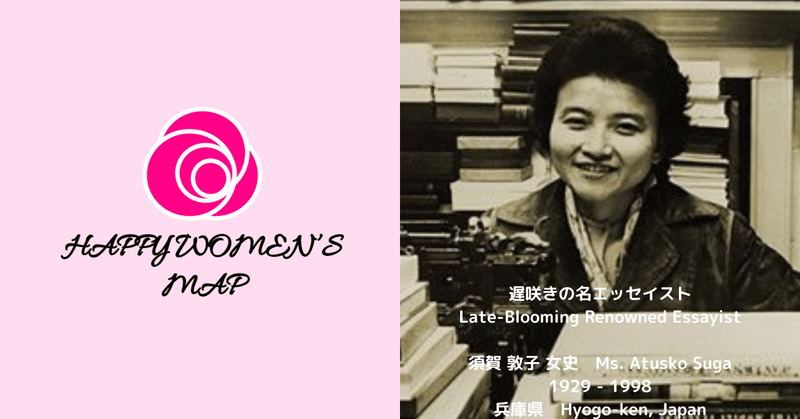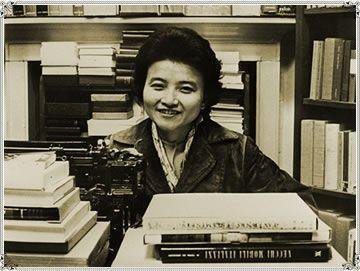
Happy Women's Map 兵庫県 遅咲きの名エッセイスト 須賀 敦子 女史 / The "Late-Blooming" Renowned Essayist, Ms. Atsuko Suga

「私という泥のなかには、信仰が、古いハスのタネのようにひそんでいるかもしれない」
"Within the mud of 'me,' faith may be lurking like the ancient seed of a lotus."
須賀 敦子 女史
Ms. Atusko Suga
1929 - 1998
兵庫県芦屋市翠ヶ丘 生誕
Born in Ashiya-city, Hyogo-ken
須賀敦子女史は教会社会活動またイタリア文学に従事したエッセイストです。カトリック左派運動の活動拠点「コルシア書店」に参加したり、カトリックの社会支援活動「エマウス運動」に従事したり、イタリア語の講師・翻訳家として活動しながら、61歳で作家デビューしました。
Ms. Atsuko Suga is Miss Atsuko Suga is an essayist engaged in church social activities and Italian literature. She has participated in the "Corsia Bookstore," a hub for the Catholic left movement, and has been engaged in the Catholic social support movement known as the "Emmaus Movement." While working as an Italian language instructor and translator, she made her debut as a writer at the age of 61.
「キリスト教」
淳子は須賀工業の創業家に生まれます。淳子の祖父・豊治郎は大阪に私設水道工事店「須賀商会」を創業、建築家ジョサイア・コンドルの知遇を得、次々と新式の輸入衛生器具を扱って衛生工事・衛生設備設計のパイオニアになります。淳子の父・豊治郎は日本貿易振興協会主催の世界一周実業視察団体旅行に参加。日本で待つ淳子たちのもとに欧米各地の珍しいお土産が次々と届きます。ある日、敦子は一緒に登下校する友達から宣言されます。「春になったら洗礼を受けるつもり。」衝撃を受けた敦子は戦後の混乱のなかで両親の反対を押し切って洗礼を受け、教会活動に打ち込みます。聖心女子大学で学び、慶應義塾大学で社会学修士課程に進学。さらにフランス神学にあこがれてパリ大学に留学します。パリでは言葉また思想の壁が敦子を苦しめます。そこでイタリア人女性・マリア・ボットーニの紹介で夏休みにペルージャでイタリア語を学ぶ機会を得ます。マリアは若いころ、イタリア共和国大統領となるレジスタンス頭領と一緒にドイツの収容所で過ごしていました。敦子はマリアが頻繁に寄こす細かい字の葉書に触れるとともに、イタリアの言葉と文化にひかれはじめます。
「コルシア書店」
敦子は一旦日本に戻ってNHKで翻訳の仕事をしながら、マリアと手紙のやり取りを続け、3年後再び奨学金を得てローマに渡ります。マリアの紹介で、ミラノの「コルシア・デイ・セルヴィ書店」通称「コルシア書店」に出入りする様になります。「コルシア書店」は反ファシスト・レジスタンス活動に身を投じる2人の神父によって設立された、新しい信仰と教会のあり方を考えるカトリック左派運動の活動拠点でした。「コルシア書店」での活動に生きるエネルギーを注ぐ敦子は、やがてジュゼッペ・リッカ(ペッピーノ)とウディネの教会で結婚します。ミラノに居を構え、ペッピーノとともに日本文学のイタリア語訳に取り組み始めますが、わずか5年でペッピーノが急逝。敦子はまもなくミラノの家を引き払って15年に渡るヨーロッパ生活を終えて日本に帰国します。42歳になっていました。
「エマウス運動」
日本に帰国した敦子はカトリックの社会支援活動、「エマウス運動」に熱中するようになります。「エマウス運動」はフランスのピエール神父が1949年に始め若者・学生が多く参加した宗教的社会活動で、大戦後に生活の手段を失った人々に住まいと廃品回収による生活基盤の提供を目指していました。敦子は日本の活動拠点である神戸のヴァラード神父を訪ね、2年後には練馬区にエマウスの家を設立し責任者となります。敦子は「エマウス運動」に熱中するかたわら、母校で講師として学生を指導しながら博士論文にも取り組み始めます。やがて敦子はイタリア経験を題材としたエッセイを執筆し始め、61歳で「ミラノ 霧の風景」で作家デビュー。女流文学賞・講談社エッセイ賞を受賞すると執筆依頼が殺到、「コルシア書店の仲間たち」「ヴェネツィアの宿」「トリエステの坂道」「ユルスナールの靴」など相次いでエッセー集を出版。母校の修道女・オディール・シュレベールを主人公とする小説「アルザスの曲りくねった道」を執筆する中で病に倒れ享年69で逝去します。
"Christianity"
Junko is born into the founding family of Suga Industries. Her grandfather, Toyojiro, established the private waterworks construction firm "Suga Shokai" in Osaka. Gaining the favor of the architect Josiah Conder, he became a pioneer in sanitary engineering and facility design by handling a succession of new imported sanitary fixtures. Junko's father, also named Toyojiro, participated in a round-the-world business inspection tour organized by the Japan External Trade Organization. Unique souvenirs from various places in Europe and America kept arriving at Junko's home in Japan. One day, Junko received a declaration from a friend with whom she walked to and from school: "I plan to receive baptism in the spring." Shocked, Junko, amidst the post-war confusion, defied her parents' objections and underwent baptism, dedicating herself to church activities. She studied at Sacred Heart Women's University and went on to pursue a master's degree in sociology at Keio University. Driven by a fascination with French theology, she studied abroad at the University of Paris. In Paris, Junko struggled with the barriers of language and thought. It was during this time that she was introduced by an Italian woman, Maria Bottoni, to an opportunity to learn Italian during the summer break in Perugia. In her youth, Maria had spent time in a German internment camp with the resistance leader who would later become the President of the Italian Republic. Touching the fine handwriting in the postcards that Maria often sent, Junko began to be drawn to the language and culture of Italy.
"Corsia Bookstore"
After returning to Japan and working as a translator at NHK for a while, Atsuko continued her correspondence with Maria. Three years later, she obtained another scholarship and returned to Rome. Through Maria's introduction, she started frequenting the "Corsia dei Servi Bookstore" in Milan, commonly known as the "Corsia Bookstore." The "Corsia Bookstore" was established by two priests dedicated to anti-fascist resistance activities, serving as a hub for the Catholic left movement, contemplating new faith and the role of the church. Immersed in the activities at the "Corsia Bookstore," Atsuko poured her energy into living out the ideals of the movement. Eventually, she married Giuseppe Ricca (Peppino) in the church in Udine. Setting up their home in Milan, Atsuko and Peppino began working on Italian translations of Japanese literature. However, just five years into their marriage, Peppino passed away suddenly. Atsuko soon left their home in Milan and concluded her 15-year European life, returning to Japan. She was 42 years old at the time. "Emaus Movement": Upon returning to Japan, Atsuko became deeply involved in the Catholic social support movement known as the
"Emmaus Movement."
Started by Father Pierre in France in 1949, the movement attracted many young people and students. It aimed to provide housing and a foundation for life through waste collection for those who lost their means of livelihood after the war. Atsuko visited Father Valard, the movement's base in Kobe, and two years later, she established an Emmaus house in Nerima Ward, Tokyo, becoming its leader. While passionately engaging in the "Emmaus Movement," Atsuko also started guiding students as a lecturer at her alma mater and began working on her doctoral thesis. Eventually, she started writing essays based on her experiences in Italy. At the age of 61, she made her debut as a writer with "Milano: Kiri no Fuukei" ("Milan: Misty Landscape"). After receiving awards such as the Women's Literary Award and the Kodansha Essay Award, she received numerous writing requests. She published essay collections one after another, including "Companions of Corsia Bookstore," "Lodging in Venice," "Hillside of Trieste," and "Shoes of Juvenile." While working on a novel titled "The Winding Road of Alsace," featuring her alma mater's nun, Odile Schreiber, as the protagonist, Atsuko fell ill and passed away at the age of 69.
-兵庫県立美術館 ネットミュージアム兵庫文学館
-イタリア文学館 須賀敦子文庫

Share Your Love and Happy Women's Story!
あなたを元気にする女性の逸話をお寄せください!
Share your story of a woman that inspires you!
この記事が気に入ったらサポートをしてみませんか?
